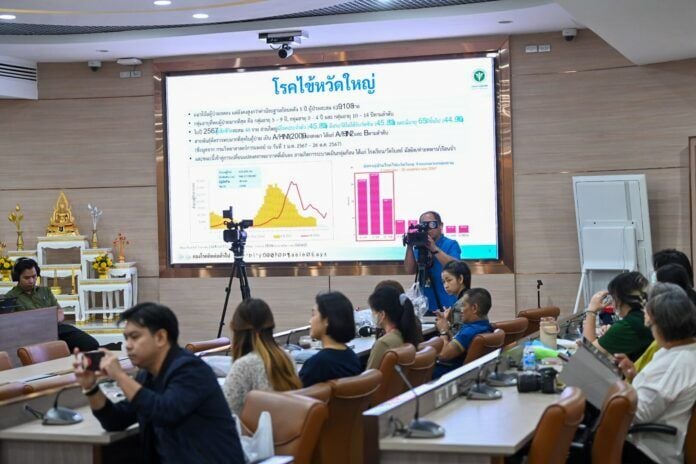Thailand health ministry warns of new year disease risks

The Ministry of Public Health issued a warning about diseases to watch out for during the new year, particularly influenza and sudden hearing loss.
They urged travellers to monitor their health upon returning from trips abroad. With the weather cooling down and many people travelling internationally, the Department of Disease Control (DDC) has updated its list of diseases with potential outbreak risks.
Covid-19 cases typically rise towards the end of the year. Last week, 730 hospitalisations were reported, an increase from 577 the week before.
Severe cases are primarily among the unvaccinated. Thailand is currently seeing the JN.1 variant at 26.5%, KP3.1 at 16.2%, and XEC at 19.1%. Despite the uptick in cases, no increased severity has been noted, and the situation is under continuous surveillance.
Influenza cases appear to decrease towards the year-end compared to the rainy season but should not be overlooked. In 2023, there was a slight increase in cases at the year’s end, especially in schools with children aged five to nine.
This year, 48 fatalities were recorded, mostly among individuals with pre-existing conditions, unvaccinated, and the elderly. The predominant strain was A/H1N1. Preventive measures for Covid-19 and influenza include regular hand washing, not sharing personal items, eating cooked food, getting vaccinated, and wearing masks in crowded places.
Dengue fever
Dengue fever cases usually decline towards year-end but remain a concern in flood-prone areas like the south. Children are the main risk group for infection, whereas the elderly with underlying conditions are at higher risk of death. Preventing mosquito bites by using repellent is crucial to stop the spread. Dengue vaccines are available in some state hospitals for a fee.
Food poisoning and acute diarrhoea, caused by bacteria and viruses, have seen a rise in cases this year, the highest in the past three years. All age groups are affected, with the most cases among school children aged five to 14. Between 2018 and 2024, 729 cases of Norovirus G1 and G3 strains were reported. Though not a new pathogen, Norovirus has become more prominent due to the reduction in Rotavirus cases following the introduction of a vaccine for infants.
There were 743,697 cases of acute diarrhoea, with two fatalities but none from Norovirus. Hygiene practices, like washing hands with soap and eating freshly cooked food, are vital for prevention. Food handlers with symptoms should refrain from work until recovery.
Other notable diseases include whooping cough, with 1,245 cases and two deaths in 2024, mainly affecting infants under two months in the south. The low vaccination coverage in this region requires emphasis on vaccination, similar to Covid-19 and influenza prevention.
Sudden hearing loss is linked to the Streptococcus suis bacteria in meat, particularly pork, from undercooked consumption. December saw three deaths among individuals over 35 with pre-existing conditions like diabetes, hypertension, and heart disease, primarily in the north and northeast.
Cooking food thoroughly, separating utensils for raw and cooked food, and protecting open wounds are necessary precautions. Symptoms range from fever to long-term hearing loss, which is challenging to recover from.

Internationally, avian influenza remains a concern with sporadic H5N1 reports but no human-to-human transmission. Recent cases in Vietnam and the USA involved contact with infected poultry. Consuming cooked poultry, eggs, and dairy, and avoiding contact with sick or dead animals, are recommended. If flu-like symptoms occur, seeking medical attention and informing about exposure risks is crucial.
Monkeypox saw 19,823 cases and 73 deaths globally in 2024, with Africa reporting the majority. Thailand recorded 175 cases mainly of Clade II, with only one Clade Ib case. Avoiding crowded places, not sharing items, and regular hand washing are advised, particularly for those with chronic illnesses or weakened immunity.
Oropouche fever, spread by midges and mosquitoes, had 11,664 cases and two deaths globally in 2024, mostly in the Americas. With a low outbreak risk in Thailand, travellers to affected regions should wear long sleeves, use insect repellent, and seek medical care if symptomatic upon return.
An unknown outbreak in the Democratic Republic of the Congo reported 527 cases and 32 deaths by December 9, mostly affecting young girls with symptoms like fever and fatigue. Further testing revealed malaria in 10 out of 12 samples, indicating the need for additional analysis.
The DDC advises those returning from abroad to maintain personal hygiene, wear masks in crowded places, wash hands frequently, and avoid sharing items. Monitoring personal health and seeking medical advice if symptoms appear within one to three weeks after travel is essential, reported KhaoSod.
Latest Thailand News
Follow The Thaiger on Google News:


























